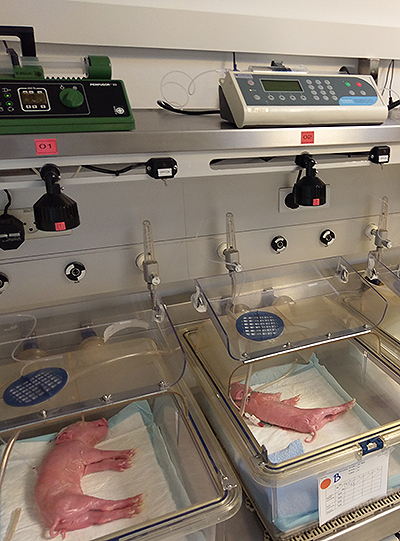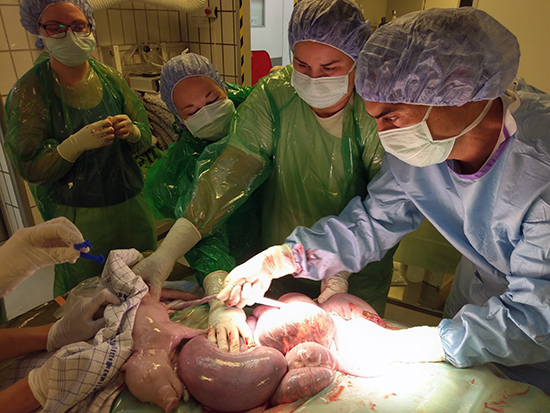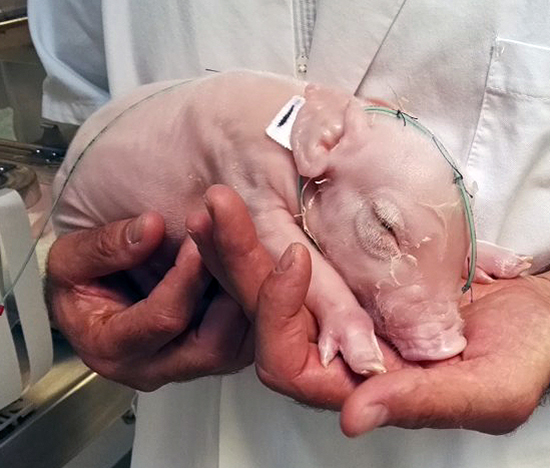Animal Models in Pediatrics
The goal is to improve survival and reduce morbidity in early life. We investigate clinical complications and identify intervention strategies related to nutrition, microbiology and pharmacology, that have clinical effect. Using piglets as models of compromised newborns, we aim to improve the health of both infants and newborn animals. We aim to have the best available models for some of the most common disease conditions in early life.
 We use piglets in research because they are important production animals in agriculture, and because they share many similarities with infants and children. Thus, we can help to understand disease conditions in both piglets and humans. We have developed animals models that reflect diseases in human pediatric patients, e.g. fetal infection, fetal obstructions, preterm birth, growth-restriction, malnutrition, sepsis, weanling diarrhea, intestinal resection and chemotherapy in children. Our studies in piglets have lead to several clinical trials in humans, and also to investigations at pig farms. We include anatomy, physiology, microbiology, immunology, endocrinology and neurology among our endpoints in piglets. Advanced surgical techniques and intensive care facilities are available to investigate a range of nutritional, bacterial and pharmacological interventions, all aimed to improve survival and reduce disease.
We use piglets in research because they are important production animals in agriculture, and because they share many similarities with infants and children. Thus, we can help to understand disease conditions in both piglets and humans. We have developed animals models that reflect diseases in human pediatric patients, e.g. fetal infection, fetal obstructions, preterm birth, growth-restriction, malnutrition, sepsis, weanling diarrhea, intestinal resection and chemotherapy in children. Our studies in piglets have lead to several clinical trials in humans, and also to investigations at pig farms. We include anatomy, physiology, microbiology, immunology, endocrinology and neurology among our endpoints in piglets. Advanced surgical techniques and intensive care facilities are available to investigate a range of nutritional, bacterial and pharmacological interventions, all aimed to improve survival and reduce disease.
“Proper animal models are central to identify the best possible nutritional and medical treatments in early life. Interpretation of research findings to both humans and production animals is key to our activities” says Professor Thomas Thymann, the group leader.
 The most well-known animal model is the preterm pig model that have lead to many other related models in pediatric research: Diet- and colonization-dependent intestinal dysfunction predisposes to necrotizing enterocolitis in preterm pigs. DOI:10.1053/j.gastro.2006.02.026
The most well-known animal model is the preterm pig model that have lead to many other related models in pediatric research: Diet- and colonization-dependent intestinal dysfunction predisposes to necrotizing enterocolitis in preterm pigs. DOI:10.1053/j.gastro.2006.02.026
Many different diet (milk) interventions are tested and bovine colostrum has shown to be very effective to support immunity and growth in early life. The results have lead to clinical trials in infants in Denmark and China: Early gradual feeding with bovine colostrum improves gut function and NEC resistance relative to infant formula in preterm pigs. DOI: 10.1152/ajpgi.00163.2015
Antibiotics and probiotics are difficult to use to combat newborn gut infections. We have shown that transplantation of fecal matter from healthy donors to newborn pigs effectively reduce gut inflammation: Effect of fecal microbiota transplantation route of administration on gut colonization and host response in preterm pigs. DOI:10.1038/s41396-018-0301-z
Arla Food amba
Arla Foods Ingredients
Biofiber-Damino
Danone Nutricia Research
Fresenius Kabi
Glaxo Smith Kline
Glycom
’Grønt Udviklings- og Demonstrationsprogram (GUDP)
Shire
Takeda
University of Copenhagen
Group members
Internal researchers
| Name | Title | Phone | |
|---|---|---|---|
| Aasmul-Olsen, Karoline | Postdoc | +4535335727 | |
| Brunse, Anders | Associate Professor | +4535337262 | |
| Cilieborg, Malene Skovsted | Project Coordinator | +4535333631 | |
| Holgersen, Kristine | Assistant Professor | +4535334875 | |
| Karlsson, Britta | Laboratory Technician | +4535324637 | |
| Larsen, Kristina Kjær | Laboratory Technician. | +4535326618 | |
| Povlsen, Jane Connie | Animal Keeper | +4535331452 | |
| Thymann, Thomas | Professor | +4535332622 |


